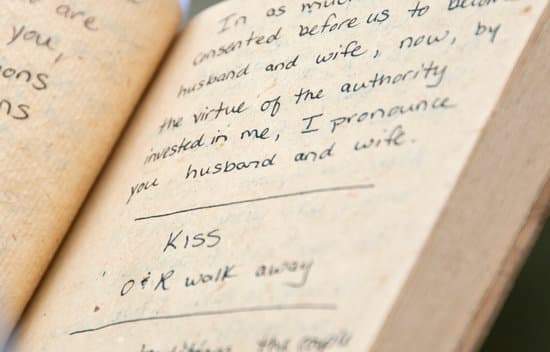Can anyone perform a wedding? The concept of who can legally officiate a wedding is a commonly asked question, and the requirements for officiating a marriage ceremony can vary depending on several factors. From religious officiants to civil officiants, there are specific legal requirements that must be met in order to perform a wedding. In this article, we will explore the regulations and laws surrounding wedding officiants, including the necessary credentials, licenses, and certifications.
When it comes to who can legally perform a wedding, there are important legal requirements that must be considered. Whether it be religious or civil officiants, each individual must adhere to specific regulations in order to conduct a marriage ceremony. These requirements can include obtaining the necessary credentials, licenses, and certifications as mandated by state and local laws.
Furthermore, we will also delve into the role of organizations such as the Universal Life Church in enabling individuals to become ordained ministers and legally perform weddings. Additionally, we will examine state-specific regulations and any limitations or restrictions that may exist for certain individuals in terms of their ability to perform a wedding. Understanding these regulations is crucial for anyone considering officiating a wedding ceremony.
Legal Requirements
To legally perform a wedding, there are specific requirements that must be met, including the necessary credentials, licenses, and certifications. In most states and jurisdictions, individuals who wish to officiate a wedding ceremony must become ordained or obtain an officiant license. The exact requirements can vary depending on the location and the type of ceremony being performed.
For religious officiants, the legal requirements for performing weddings often center around their affiliation with a recognized religious organization or denomination. Many states allow clergy members, such as priests, ministers, rabbis, or imams, to officiate weddings without needing to obtain additional licensing or credentials. However, it is essential for them to have documentation verifying their status within their religious institution.
On the other hand, non-religious or civil officiants may need to complete a formal application process or register with a relevant government agency to become authorized to perform marriages. Some states require these individuals to obtain a one-time license or registration specifically for the purpose of solemnizing marriages.
One well-known organization that offers ordination and allows individuals to legally perform weddings is the Universal Life Church (ULC). Through their online ordination process, anyone can become an ordained minister and gain the legal authority to officiate weddings in many states. It’s important for anyone interested in becoming ordained through ULC or similar entities to verify the legality of their ordination within the specific jurisdiction where they plan to perform ceremonies.
| Requirements | Religious Officiants | Civil Officiants |
|---|---|---|
| Documentation from recognized religious organization | Formal application or registration with government agency | |
| Ordination through Universal Life Church | Legal authority varies by state |
Religious Officiants
When it comes to the ability to perform a wedding ceremony, one of the most common questions that arises is whether religious officiants have the legal authority to officiate weddings within their faith. The answer to this question largely depends on the specific rules and regulations set forth by individual religious institutions and the laws of the state or jurisdiction in which the marriage is taking place.
Here are some key points to consider when exploring the role of religious officiants in performing wedding ceremonies:
1. Religious Requirements: Different religions have varying requirements for individuals to become ordained or recognized as religious leaders with the authority to perform weddings. For example, in some Christian denominations, individuals may need to undergo a formal ordination process, while in other faiths, such as Hinduism or Buddhism, specific training or initiation rites may be required.
2. Legal Recognition: While many states and jurisdictions recognize marriages performed by religious officiants, it’s important to note that there can be differences in how different religious leaders are granted legal authority. Some states may require additional registration or documentation for a religious officiant’s marriage ceremonies to be legally valid.
3. Interfaith Marriages: In cases where couples from different religious backgrounds wish to have a wedding ceremony that reflects both of their faith traditions, it’s essential to understand how different religions approach these types of unions and what requirements must be met for each tradition.
It’s crucial for anyone considering becoming a religious officiant or working with one for their wedding ceremony to thoroughly research and understand the specific rules and regulations relevant to their faith and location. This can involve consulting with local religious authorities, researching state laws, and obtaining any necessary credentials or permissions.
Civil Officiants
Becoming an authorized civil officiant to perform weddings is a straightforward process that involves specific steps and documentation. Unlike religious officiants, non-religious individuals need to follow distinct legal requirements to officiate marriages. So, can anyone perform a wedding? The answer is yes, as long as they meet the necessary criteria and complete the required procedures.
To become an authorized civil officiant, one of the essential steps is to obtain a marriage officiant license or registration in the jurisdiction where the wedding will take place. The process for obtaining this credential may vary depending on the state or locality, but generally involves submitting an application, paying a fee, and providing proof of identification.
In addition to obtaining a marriage officiant license, non-religious individuals looking to perform weddings may also be required to undergo training or education related to marriage laws and ceremony procedures. This could involve taking a course or workshop specifically designed for wedding officiants, providing them with the knowledge and skills necessary to conduct a legally binding marriage ceremony.
| Key Steps | Necessary Documentation |
|---|---|
| Obtain Marriage Officiant License/Registration | Application form, identification documents, fee payment |
| Undergo Training/Education | Certificates of completion, course materials |
Universal Life Church
The Universal Life Church (ULC) plays a significant role in enabling individuals to become ordained ministers and legally perform weddings. Founded on the principles of religious freedom and the belief that everyone has the right to practice their own spiritual beliefs, the ULC offers a simple and accessible process for ordination.
Through the ULC, anyone seeking to officiate a wedding can become legally qualified to do so. The following points highlight the role of the Universal Life Church in this capacity:
- Simple Ordination Process: One of the defining features of the ULC is its uncomplicated ordination process. Individuals interested in becoming ordained ministers can easily do so by filling out a brief online form and providing basic personal information. Once ordained, they gain legal recognition to officiate weddings and other ceremonial duties.
- Legal Recognition: The Universal Life Church’s ordination provides individuals with the legal authority to perform weddings in most states. While there may be variations in requirements from one jurisdiction to another, many states accept ULC ordination as valid for officiating marriage ceremonies.
State-Specific Regulations
Understanding State Variations
The ability to legally perform a wedding ceremony varies from state to state within the United States. Each state has its own set of laws and regulations regarding who can officiate a marriage, which means that what is permissible in one state may not be allowed in another. It is crucial for anyone considering becoming a wedding officiant to familiarize themselves with the specific requirements in their particular state or the state where the wedding will take place.
License and Registration
In some states, individuals who wish to officiate weddings must obtain a special license or registration from a government office, such as the county clerk’s office. The process for obtaining this authorization can vary widely, ranging from attending a simple seminar to submitting detailed paperwork and waiting for approval. Prospective officiants should research the specific procedures and requirements mandated by their local jurisdiction.
Out-of-State Officiants
For those looking to perform weddings in states other than their own, it is important to understand any limitations or restrictions that may apply. Some states have specific rules regarding out-of-state officiants, which could include additional paperwork or temporary registration. Individuals hoping to serve as officiants across multiple states should carefully review the regulations in each location where they anticipate performing ceremonies.
As you can see, understanding and navigating the state-specific regulations pertaining to wedding officiants is an essential part of preparing to conduct marriage ceremonies. Whether someone is considering becoming an officiant or simply wants to ensure that their chosen officiant has fulfilled all legal requirements, taking into account the varying laws and regulations across different states is crucial for successfully performing a wedding ceremony.
Limitations and Restrictions
Age Requirements
In many states, there are specific age requirements for individuals looking to become ordained and officiate weddings. Typically, the minimum age is 18 years old, although some states may have different age restrictions in place. It’s important for anyone considering becoming an officiant to check the legal age requirements in their particular state before pursuing this path.
Criminal History
Individuals with certain criminal histories may face limitations or restrictions when it comes to performing weddings. Some states may prohibit individuals with certain types of criminal records from becoming ordained ministers or officiating wedding ceremonies. Before pursuing ordination or officiating a wedding, it’s crucial for individuals to research the laws and regulations in their state regarding criminal history and its impact on becoming an officiant.
Other Limitations
In addition to age and criminal history requirements, there may be other limitations or restrictions that can affect an individual’s ability to perform a wedding. For example, some states may have residency requirements or other specific regulations that must be met before someone can legally officiate a marriage ceremony. It’s important for anyone considering this role to thoroughly research the laws and regulations in their state to ensure they meet all necessary qualifications.
While many people are eligible to become ordained ministers and perform weddings, it’s essential to understand that there are limitations and restrictions that vary by state. By being aware of these potential barriers, individuals can take the necessary steps to ensure they meet all legal requirements before officiating a marriage ceremony.
Conclusion
In conclusion, the process of legally performing a wedding ceremony involves specific requirements and considerations that vary depending on the officiant’s religious or civil status and state regulations. While the notion of who can perform a wedding may seem straightforward, there are essential factors to take into account before pursuing this role. It is crucial for anyone interested in officiating weddings to thoroughly research and understand the legal and ethical responsibilities that come with this position.
For religious officiants, it is important to familiarize oneself with the rules and regulations within their faith. Understanding the specific requirements for ordination or licensing within their religious denomination can help ensure that they are properly authorized to officiate weddings according to their beliefs. On the other hand, non-religious individuals looking to become an officiant should take note of the legal processes required for authorization, such as obtaining a marriage solemnization license or registration from their respective state.
Furthermore, whether considering religious or civil officiation, individuals should be aware of any potential limitations or restrictions that may apply to them. Some states have age requirements or other eligibility criteria for becoming a wedding officiant, while others may have specific laws governing who is permitted to perform weddings in their jurisdiction.
Overall, taking these considerations into account will help ensure that those interested in performing weddings proceed with full awareness and understanding of the responsibilities involved. Anyone considering entering this role should also seek guidance from established resources such as The Universal Life Church to navigate through the process successfully.
Frequently Asked Questions
Who Officiates a Non Religious Wedding?
A non-religious wedding can be officiated by a government official such as a judge, justice of the peace, or a court clerk. In some states, an ordained minister or even a friend or family member can become authorized to officiate weddings without any religious affiliation.
Can You Perform at Your Own Wedding?
In some states and countries, it is possible for individuals to perform at their own wedding ceremony. However, this often depends on local laws and regulations. Couples should check with their local government office or marriage authority to determine the specific rules regarding self-officiating at weddings.
Can a Family Member Officiate a Wedding in Florida?
In Florida, it is possible for a family member or friend to officiate a wedding ceremony if they become ordained as a notary public or through an organization that offers ordination services. They must also comply with the state’s marriage laws and be registered as an officiant with the appropriate county office prior to conducting the ceremony.

I have been involved in marriages for over 20 years helping couples and singles understand more about them.





